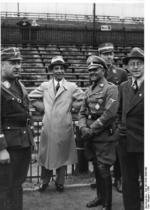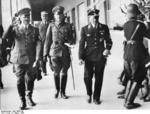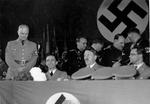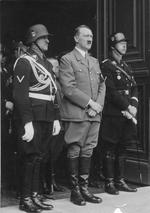Josef Dietrich
| Surname | Dietrich |
| Given Name | Josef |
| Born | 28 May 1892 |
| Died | 22 Apr 1966 |
| Country | Germany |
| Category | Military-Ground |
| Gender | Male |
Contributor: C. Peter Chen
ww2dbaseJosef "Sepp" Dietrich joined the German Army in 1911 and was decorated for bravery during WW1. As a member of the National Socialist German Workers Party, he joined the Schutstaffel, the SS, in 1928. He was taken notice by Adolf Hitler, and named the head of Hitler's personal bodyguard unit. In 1934, Dietrich led an execution squad during the Night of the Long Knives.
ww2dbaseDuring the invasion of France Dietrich led the 1st SS Panzer Division. He also participated in Operation Barbarossa and later in the defense of Italy. When the Normandy invasion began, Dietrich was in Brussels visiting a base of Hitler's bodyguards. He returned to Paris and prepared to deploy to Normandy. His immediate superior at that time was Gerd von Rundstedt, who ordered him to take the Panzer Lehr Division, the 21st Panzer Division, and 12th SS Grenadier Division to drive the Allies back into the sea. Dietrich was unable to do so, with his movement limited heavily by the Allied air supremacy. "He is decent but stupid", Hermann Göring later said in an interview. "He had at most the ability to command a division." Despite Dietrich's unimpressive abilities, he was promoted to Oberfuhrer on 1 Aug 1944 after repulsing a British armor assault and continued to take on important responsibilities including commanding a key element in the later Ardennes offensive (the Battle of the Bulge). The reason for the continued promotion dated back to the beginning of Dietrich's career in Nazi Germany government as a member of the SS. After the 20 Jul assassination attempt on Adolf Hitler, the untrustful German leader relied more and more upon members of the Nazi party in military matters, fearing that disloyal men now filled the command ranks. As such, Dietrich the former butcher took on important military posts even without the leadership abilities. Rundstedt and Walther Model both disrespected Dietrich's abilities, but had no say in Hitler's orders; all they could do was assign Dietrich with the best staff officers they could find to prevent Dietrich from committing any mistakes.
ww2dbaseThroughout the war Dietrich was known as a brutal commander with a merciless reputation with prisoners of war. This reputation came largely from his days on the Russian front when he routinely executed captured Russian soldiers. During the Battle of the Bulge, Dietrich's 6th SS Panzer Army massacred 100 surrendered American soldiers in Malmédy.
ww2dbaseDietrich surrendered to the US Army in 1945 in Austria, and was later tried and convicted of killing prisoners of war. He was sentenced to 25 years imprisonment, though was released after serving 10 years. He was later arrested and charged for murders during the Night of the Long Knives, with punishment of 18 months imprisonment. Dietrich suffered a heartattack in 1966 and passed away in Ludwigburg, Germany. 6,000 former Waffen SS members turned out for his funeral, a statement for the loyalty his men had for him.
ww2dbaseSources: Battle of the Bulge/Dark December, Wikipedia.
Last Major Revision: Sep 2005
Josef Dietrich Interactive Map
Photographs
 |  |  |  |
Josef Dietrich Timeline
| 28 May 1892 | Josef Dietrich was born. |
| 27 Jun 1934 | Sepp Dietrich requested the German Reichwehr authorities for arms so that the Liebstandarte could carry out what he called "a secret and most important mission ordered by the Führer" (ie. the slaughter of dissident elements within the SA). |
| 16 Jul 1945 | The US Military Tribunal at Dachau, Germany sentenced Josef Dietrich to life in prison (later commuted to 25 years in prison) for the execution of US prisoners of war at Malmedy, Belgium in 1944. |
| 14 May 1957 | A German court sentenced Joseph Dietrich to 29 months in prison for his participation in the Night of the Long Knives in 1934. |
| 22 Apr 1966 | Josef Dietrich passed away. |
Did you enjoy this article or find this article helpful? If so, please consider supporting us on Patreon. Even $1 per month will go a long way! Thank you. Share this article with your friends: Stay updated with WW2DB: |
Visitor Submitted Comments
27 Jan 2007 01:23:17 AM
Seppi was not as bad as you make out. He had more than one serious run-in with Hitler about his horror at witnessing the execution of Jewish civilians in sectors he operated in and as far as I am aware fought with galantry and considerable elan. It is true that he had some of the best staff officers available, including the brilliant Rudolph Lehmanm and he relied on them (his tall fellows) a great deal. It can also be said that he inspired them and earned their respect as a good leader. He was also more chivalrous than most as evidenced by his treatemt of the Greek Army that surrendered to him in the battle for Greece. Unfortunately, it is still fashionable to denegrate the achievements of SS Officers, but the truth is that were some incredibly able leaders amongst them...a few of them practising Christians with high humanitarian ideals and principals...but that is another story.
8 Feb 2007 01:34:23 PM
His treatment of greek prisoners doesnt make up for his treatment of Russians and Americans later on.
5 Feb 2012 06:57:31 PM
as far as the eastern front, neither side took many prisoners after a while. the russians were indoctrinated to behave on the level of brutal animals towards their prisoners and civilians, with no regard for the rules of war.
26 Apr 2015 04:53:16 AM
After the Ardennes retreat, Sepp Dietrich performed a masterly delaying action against the Russians from Hungary into Austria, but Hitler, unimpressed stripped him of his medals - which Dietrich reputedly sent back in a chamber pot.
All visitor submitted comments are opinions of those making the submissions and do not reflect views of WW2DB.
» Invasion of France and the Low Countries
» Battle of the Bulge
- » 1,150 biographies
- » 337 events
- » 44,024 timeline entries
- » 1,242 ships
- » 350 aircraft models
- » 207 vehicle models
- » 375 weapon models
- » 123 historical documents
- » 260 facilities
- » 470 book reviews
- » 28,598 photos
- » 432 maps
Winston Churchill
Please consider supporting us on Patreon. Even $1 a month will go a long way. Thank you!
Or, please support us by purchasing some WW2DB merchandise at TeeSpring, Thank you!
20 Aug 2006 04:51:17 PM
I OWN SEPPS LUCKY COMBAT DRINKING CUP... DOES ANYONE OWN A PHOTO WITH SEPP HOLDING THE CUP PLEASE HELP